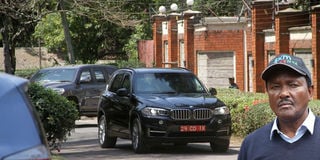Premium
Envoys pile pressure on President Ruto and Raila Odinga to talk, end protests

An envoy’s car leaves the home of Wiper party leader Kalonzo Musyoka (inset) in Karen on July 21. The international community has called for dialogue to end the anti-government protests.
The international community is piling pressure on President William Ruto and opposition leader Raila Odinga to dialogue and end killings and destruction of property as a result of anti-government protests.
The diplomats have taken the initiative to reach out to both camps to end the protests and rebuild the economy.
Barely a day after 13 ambassadors and high commissioners expressed their concern over loss of lives and high levels of violence and destruction of property, the international community started reaching out to the government and opposition hoping to help reach a deal acceptable by both sides.
On Friday last Week, Wiper Party leader Kalonzo Musyoka held talks with ambassadors from Europe, the US and the United Nations at his Karen residence as international efforts to broker a truce gathered momentum.
The Nation established that the team has also reached out to President Ruto.
The envoys, according to insiders in Azimio la Umoja One Kenya, held talks with Mr Musyoka in the company of National Assembly Minority Leader Opiyo Wandayi and Jubilee Secretary-General Jeremiah Kioni, a meeting sanctioned by Mr Odinga to give the international community a hearing.
Even though Mr Musyoka confirmed the meeting, he did not divulge its details, but the Nation is reliably informed that the opposition leaders remained firm on their demands, with the reduction of the high cost of living top on their list.
The insiders said Mr Musyoka presented Azimio demands to the diplomats, including “to lower the cost of living, a halt to the unilateral reconstitution of IEBC (Independent Electoral and Boundaries Commission), respect for multi-party democracy and audit of IEBC servers with a view to enhancing electoral justice in the country”.
Azimio also pushed for the international community to stop the regime from what it termed brutalisation of innocent citizens exercising their right to protest.
“That was the first meeting our team held with the diplomats and they were positive, promising to reach out to the government side with a view to helping in the solution of the current impasse,” a source privy to the talks said on Sunday.
The pressure from the foreign missions, coupled with that of religious leaders, is said to be the reason President Ruto has publicly said he was not opposed to talks, even as he maintained that the discussions must strictly be on issues affecting Kenyans and not power sharing.
Legal avenues
“We told our opponents to engage us in talks (through parliamentary leadership) on the issues they raised, but they chose to use demonstrations. They should use constitutional and legal avenues to address their grievances, if any,” President Ruto said in Kericho last week.
Mr Odinga has repeatedly denied seeking a power-sharing deal. In a phone interview with NTV on Thursday, Mr Odinga re-affirmed neither he nor the other Azimio co-principals wanted such a deal.
“Sisi hatujauliza na hatutauliza mambo ya handshake. Handshake ni porojo yao. Hatutaki (We have not asked for a Handshake and we will not ask for it. Handshake claims are their propaganda. We don’t want),” he said.
The Nation understands that even as the envoys push for talks, they could also recommend sanctions, including travel bans, on either side of the political divide.
President Ruto’s administration had in March written to foreign powers asking them to impose sanctions on Azimio leaders over mass action and rejection of his electoral win. So far, no sanctions have been meted on any leader based on the current impasse.
As pressure mounts for dialogue as the best approach to address the stalemate, some leaders from both camps have appeared to maintain a hard-line stance.
On Sunday (July 23, 2023) National Assembly Majority Kimani Ichung’wa said that whereas they welcome the envoys’ sharing of best practices and experiences to handle the country’s situation, Kenya remains a “sovereign state”. He denied knowledge of any push by the envoys for dialogue with Azimio, but noted that Kenya Kwanza is ready and willing to engage the opposition on the sole matter of the reconstitution of the electoral commission.
“We have insisted all along we are ready to proceed with the bipartisan talks and have consistently re-invited Azimio back to the discussion table. As indicated on Sunday, in view of the call by the religious leaders to resume the bipartisan talks on the singular agenda of the reconstitution of IEBC, we are ready even tomorrow to continue on this,” Mr Ichung’wa said.
On the diplomat’s offer to steer dialogue, he said: “On the singular agenda of IEBC reconstitution we could benefit from best practices elsewhere from the envoys but we are a sovereign nation therefore them spearheading a process like this may not be feasible.”
UDA Secretary-General Cleophas Malala said they have no problem with the envoys’ push for dialogue “as long as the talks maintain the lane of constitutionality and the general rule of law”.
“On elections, we can only talk about 2027. August 2022 is done and dusted. The winners are well known and Kenyans should live with that reality for the next five years,” Mr Malala said.
Azimio co-principal Eugene Wamalwa blamed the international community for taking too long to help the country stabilise as Kenyans continue to face the wrath of a “brutal regime.”
“Why can’t they speak out and say no to these killings?” he asked.
The Commonwealth, in a statement last week, said it is concerned with the escalating violence, and asked leaders to resolve the challenges Kenya faces through dialogue.
“We strongly encourage parties to engage in constructive dialogue, based upon Commonwealth values and mutual respect and for Kenya’s leaders to quickly explore practical and sustainable solutions to the challenges their country and communities face,” it said.





